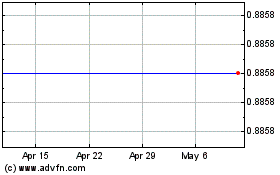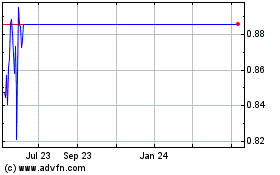MEXICO CITY—Donald Trump's recent visit to Mexico, widely seen
in the country as a humiliation, claimed a high-profile political
victim on Wednesday with the resignation of Finance Minister Luis
Videgaray, President Enrique Peñ a Nieto's closest adviser.
Mr. Videgaray, who played a key role in helping orchestrate the
Trump trip, was succeeded by José Antonio Meade, the country's
social development minister and former finance chief, Mr. Peñ a
Nieto told a news conference.
Mr. Videgaray's departure is a blow to the president. The former
investment banker was widely seen as the brains behind the Mexican
president and the driving force behind a series of high-profile
overhauls in the past few years, including opening Mexico's closed
oil industry to private investment for the first time since
1938.
Former Foreign Minister Jorge Castaneda described Mr. Videgaray
on Twitter as Mexico's de facto prime minister, asking "who will
play that role now?"
Neither the president nor Mr. Videgaray gave a reason for the
resignation. But it comes amid a public uproar over last week's
visit by Mr. Trump, who is widely disliked in Mexico for his
campaign rhetoric about the country and its people as well as his
proposal to build a border wall and have Mexico pay for it. Mr.
Videgaray had met with Mr. Trump's son-in-law before the visit, a
person close to the Mexican government said.
The visit was seen as a disaster for Mr. Peñ a Nieto, who was
seen as failing to stand up to Mr. Trump and treating him like a
visiting head of state. The Mexican leader is already struggling
with the lowest approval ratings of any Mexican leader in the past
two decades, and analysts expect those ratings to fall further.
Polls showed 85% of Mexicans thought the Trump visit was a bad
idea.
In the days that followed the visit, obvious splits emerged in
Mexico's cabinet. The Foreign Ministry and the powerful Interior
Ministry both made it clear they hadn't supported the idea, and
media reports soon placed the blame for the invitation on Mr.
Videgaray.
"People are so fed up and bloodthirsty that a big head had to
roll, so Luis fell on his sword," said a person close to Mr.
Videgaray. "He is not only paying for his mistakes but for the
mistakes of the government in its totality."
The cabinet reshuffle is the first step by the president in
trying to limit the damage from the Trump visit, said Guillermo
Valdé s, a former head of Mexico's intelligence agency. "It's the
least he could do to try to recover some credibility given that he
has 27 months left in power," he said.
Mr. Videgaray was the intellectual force behind several key
overhauls to Mexico's economy, including opening up the oil
industry, boosting competition in the telecommunications industry,
and changes to the education system that force the powerful teacher
union to end decades-old practices like inheritable teacher
positions.
"He's leaving with a superb track record on reforms, and will be
remembered as one of the main architects of the reform efforts
going back to 2013," said Alonso Cervera, Credit Suisse's chief
Latin America economist.
Mr. Videgaray won't take a public post for now, Finance Ministry
spokeswoman Claudia Algorri said.
In the past two years, Mr. Videgaray has come under fire for
tepid growth in the Mexican economy, as the government ran slightly
bigger deficits and added to public debt. He also rankled Mexico's
business class by raising taxes. Widely admired outside Mexico, at
home he was often criticized for being arrogant.
While he became an increasingly unpopular figure along with the
president, his final undoing was clearly Mr. Trump's visit, said
Jonathan Heath, a Mexico City-based economist.
Several weeks ago, a mutual friend on Wall Street brought Mr.
Videgaray together in New York with Jared Kushner, Mr. Trump's
son-in-law and a key adviser, according to a person close to
Mexico's government.
That initial meeting went well, the person said, and Mr.
Videgaray was eager to build a relationship with Mr. Trump's camp
to ease jitters in financial markets over the effects on Mexico of
a possible Trump presidency. Mexico's peso has weakened every time
Mr. Trump has risen in the polls, due to his negative comments
about trade with Mexico and claims that Mexicans are stealing U.S.
jobs.
Mr. Peñ a Nieto has publicly said it was his idea to invite Mr.
Trump to Mexico; the person close to the government said Mr.
Videgaray encouraged the initiative. It was Mr. Videgaray who
received Mr. Trump in Mexico's presidential hangar and took him to
the Los Pinos presidential residence, where Mr. Trump met with the
president.
Other ministries felt blindsided by the visit. Mexico´ s Foreign
Minister Claudia Ruiz Massieu was inaugurating a new Mexican
consulate in Milwaukee on Aug. 30, just hours before the surprise
meeting was disclosed. The visit fit into a public-relations blitz
she was leading in the U.S. aimed at countering the negative
perceptions of Mexico generated by Mr. Trump´ s campaign.
Mr. Videgaray tendered his resignation once before, in late
2014, when The Wall Street Journal reported he had bought a weekend
house at preferential terms from a controversial government
contractor who had also sold a home to first lady Angelica Rivera.
At the time, Mr. Peñ a Nieto didn't accept the resignation.
Despite that scandal, Mr. Videgaray was seen by most economists
as a check on the political demands of the president's PRI party.
Mr. Videgaray was strongly supportive of recent anticorruption
legislation and stood up to the president on matters of public
spending, they said.
Economic growth in the first three years of the Peñ a Nieto
administration averaged 2% a year. Public-sector debt rose from 38%
of gross domestic product in 2012 to 48% in 2015, and is expected
to exceed 50% by the end of this year. Rising public debt recently
prompted Moody's Investors Service and Standard & Poor's to
change Mexico's outlook to negative.
Mr. Vidagaray's successor, José Antonio Meade, is a 47-year-old
with a doctorate in economics from Yale University and a long
history of working in government. He was finance minister from 2011
to 2012 under President Felipe Calderó n, after serving as Mr.
Calderon's energy minister. Under Mr. Peñ a Nieto he has been
foreign minister and minister for social development.
"His previous tenure was solid, without being extraordinary.
He's seen as very orthodox, which is a good thing given rising debt
and the need for a budget adjustment," said Oscar Vera, a Mexican
economist.
Anthony Harrup and Santiago Pé rez contributed to this
article.
Write to David Luhnow at david.luhnow@wsj.com
(END) Dow Jones Newswires
September 08, 2016 01:55 ET (05:55 GMT)
Copyright (c) 2016 Dow Jones & Company, Inc.
Credit Suisse (NYSE:CS)
Historical Stock Chart
From Mar 2024 to Apr 2024

Credit Suisse (NYSE:CS)
Historical Stock Chart
From Apr 2023 to Apr 2024
